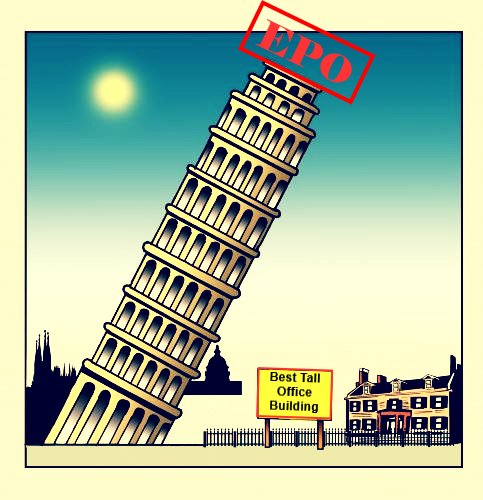


THIS MORNING we ranted about the European media intentionally ignoring the European Patent Office's (EPO) scandals, of which there are so many. President António Campinos, like his predecessor Battistelli, must really be enjoying his immunity and impunity (even protection from the media). These people can do almost anything they want and Campinos thought about lending immunity to his criminal son (after he had committed a serious crime). Are these people drunk on power or just literally drunk? Perhaps both. The previous post spoke about patents on life and the one beforehand about software patents in Europe. These aren't legal. European authorities say so, but the EPO chooses to ignore authorities, the law/EPC, even courts.
In a letter that the SUEPO sent to president Campinos last week, with a copy to all delegations of the Administrative Council, the SUEPO warns social tensions are far from over and expresses concern that Campinos has celebrated “major” achievements, whereas they are, ‘in our opinion, only a few, relatively minor steps towards the necessary re-establishment of the Rule of Law at the EPO. These steps are simply the beginning of a long process, and are far from being sufficient to restore social peace after years of massive staff rights violations under Mr Battistelli.’
In the letter, the SUEPO also criticizes the way in which Campinos expressed himself about pending cases of sanctioned union and staff representatives. Although last year the Administrative Tribunal of the ILO reversed dismissals and downgrading of three SUEPO leaders by former EPO president Battistelli, this has not led to quick actions by Campinos in similarly questionable cases: ‘You wrote: “[T]he office cannot accept any terms of settlement especially where demands involve excessively high financial compensation”. (sic)’ According to the SUEPO, ‘[t]his statement is highly disingenuous. The individuals in question only ask what is owed to them, to restore the status quo ante: nothing more. What is owed may now be substantial, but by no means excessive.’
EPO president António Campinos came in charge in July 2018 and said listening to the staff would be a high priority for him. Disappointingly to many, this has not led to important changes nor a better social climate. A recent internal survey showed EPO staff has a very negative view of management effectiveness, low confidence in senior management decisions and lack of clarity about direction. Alarming and ominous as well: only 39 percent of staff member think they are treated with respect.
It is incomprehensible that Mr Campinos act in this way.
Why does he endorse the mad actions of his predecessor? Why does he protect top managers who acted illegally and de facto maintains injustice to those who have suffered from their actions?
Not only the sanctioned staff reps but the entire EPO structure is maintained under far too high production pressure, fear of retaliation and thus chronical stress.
He is a lawyer by training. Why does he do at the EPO what he could never have done in Brussels in the EU institutions?
Can someone explain to me what purpose does this strategy serve? Does he (do they) take pleasure in making people suffer?
Neither the new President nor anybody in Senior Management has the intention to change anything – aside from cutting costs, meaning reduced staff benefits, with the support of the bogus financial study.
We have seen one area of major progress: information technology. Here, the Office decided to rely on Google Chrome as third browser, in addition to Internet Explorer and Firefox. This will, without doubt, massively boost quality, quantity, motivation and staff engagement.
The latest talk is about an “agile culture” which allegedly has brought major benefits in various companies. So far, I still miss an explanation of what “agile culture” is and how it shall be compliant with the very rigid guidelines we have on how search and examination are to be carried out. We examiners are not at liberty in performing these tasks. More or less every step is regulated down to the tiny detail. I have the feeling my top management remains blissfully ignorant about the services the Office provides and the work done by substantive examiners.
As to the staff survey with devastating results, the only visible reaction is an assurance that “work is going on”. Hm. I would not know about you, but getting slapped in face for lack of respect and having nothing to offer aside from fuzzy, unsubstantiated assurances falls somewhat short. Months have passed, there is nothing tangible.
The Council, in all likelihood, will not do anything substantial. They have become very good in doing this during the last years.
We examiners are between a rock and a hard place. The only way to remain sane and healthy is to adapt the quality we deliver to the time we are allowed to spend. Professional pride in doing a good job is outdated.
T2377/17 concerns an application for which over 16 years elapsed between regional phase entry (October 1999) and issuance of the first Rule 71(3) communication (August 2016). In T2707/16, the first instance decision to refuse (July 2016) was over 14 years after the filing date (November 2001).
Clearly these are exceptionally long durations for patent examination, considering the 20-year maximum term of a patent. The Board did not provide any hard line as to exactly when accumulated examination delays tip from merely long to excessive, but does provide a thorough assessment of the factors that should be considered in reaching a conclusion either way.
[...]
The decision T2707/16 emphasises that examination should not be rushed, acknowledging the skill and effort required for quality examination of patent applications, which it notes is an “intellectually demanding task of high responsibility” (reasons 18). Here, a distinction should be made between the actual time that an examiner requires to prepare for and write an examination report, which is a necessary expenditure of time, and the time that the patent application spends in a queue for examination, which is an unnecessary delay.
T2707/16 further takes care to avoid criticising individual examiners, instead calling out the system that allows files to languish in cupboards real or electronic for so many years (reasons 33).
G1/05 and T84/82 are also referenced. In particular T84/82 notes the aim of the EPO “to carry out the substantive examination thoroughly, efficiently and expeditiously”. Hence not only should undue delays be avoided, but examination should also be thorough and not rushed.
[...]
In contrast to the focus on EPO stakeholders in the recent EPO survey on postponed examination, the Board 3.5.07 considered in T2707/16 and T2377/17 the needs of the wider public and the position and purpose of the patent system in the economy.
The European Patent Office (EPO) has censored contributions to its public consultation ‘EPO2023’ from spanish companies and citizens. The EPO wanted input from the public on how they could “improve” themselves, but failed to be inclusive.
Seven contributions were refused on the basis that the EPO only accept contributions from the public only in its official three languages: English, German, French). Apparently, other contributions in Dutch were also censored.
The first form was already biased as the EPO considered all companies to be “patent applicants”, so a normal company interested in to participate had to tick the option “other” instead of “company”.